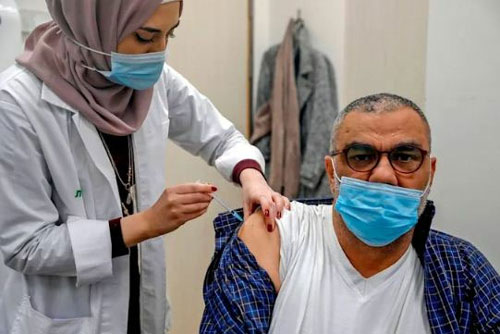Jerusalem
The Palestinian Authority has called off an agreement whereby Israel would transfer one million doses of coronavirus vaccines to it in exchange for a similar number later this year.
The PA said the doses, which Israel began shipping to the occupied West Bank on Friday, were too close to expiring.
Palestinian officials had come under heavy criticism on social media after the agreement was announced earlier Friday, with Palestinians accusing them of accepting subpar vaccines and suggesting they might not be effective.
In announcing the agreement, Israel said the vaccines will expire soon without specifying the date.
Israel has completely reopened after carrying out a highly successful vaccination campaign, but has faced criticism for not sharing its supplies with the 4.5 million Palestinians living in West Bank and the Gaza Strip.
The disparity has played out across the globe as the bulk of vaccines went to wealthy countries.
As those countries have made progress containing their own outbreaks, they have recently begun pledging supplies for poorer countries that were left behind for months.
The new Israeli government, which was sworn in on Sunday, said it would transfer Pfizer vaccines that will expire soon, and that the Palestinian Authority would reimburse it with a similar number of vaccines when it receives them from the pharmaceutical company in September or October.
Up to 1.4 million doses could be exchanged, the government said in a statement. “We will continue to find effective ways to cooperate for the benefit of people in the region,” Foreign Minister Yair Lapid tweeted after the deal was announced.
Cogat, the Israeli military body that coordinates civilian affairs in the occupied territories, said it had coordinated the delivery of the first 100,000 doses to the West Bank on Friday.
The Palestinians portrayed the agreement differently, saying Pfizer had suggested the transfer as a way of speeding up its delivery of four million doses that the PA had already paid for in an agreement reached directly with the drug company.
“This is not an agreement with Israel, but with the Pfizer company,” Palestinian Health Minister Mai Alkaila said, according to the official Wafa news agency.
Israel has carried out one of the most successful vaccination programmes in the world, allowing it to fully reopen businesses and schools.
This week, authorities lifted the requirement to wear masks in public, one of the last remaining restrictions.
Rights groups have said that Israel, as an occupying power, is obliged to provide vaccines to the Palestinians.
Israel denies having such an obligation, pointing to interim peace agreements reached with the Palestinians in the 1990s.
Those agreements say the PA, which has limited autonomy in parts of the occupied West Bank, is responsible for health care, but that the two sides should cooperate to combat pandemics.
Israel has offered vaccines to the more than 100,000 Palestinians from the occupied West Bank who work inside Israel, as well as Palestinians in east Jerusalem.—AP










